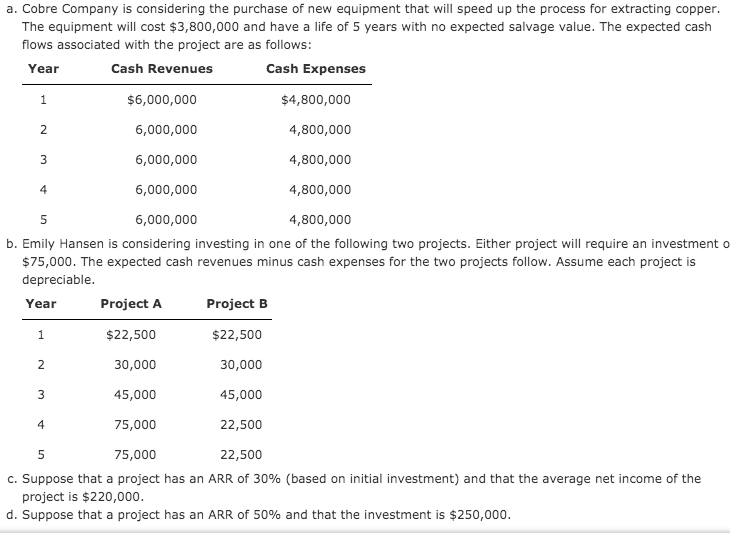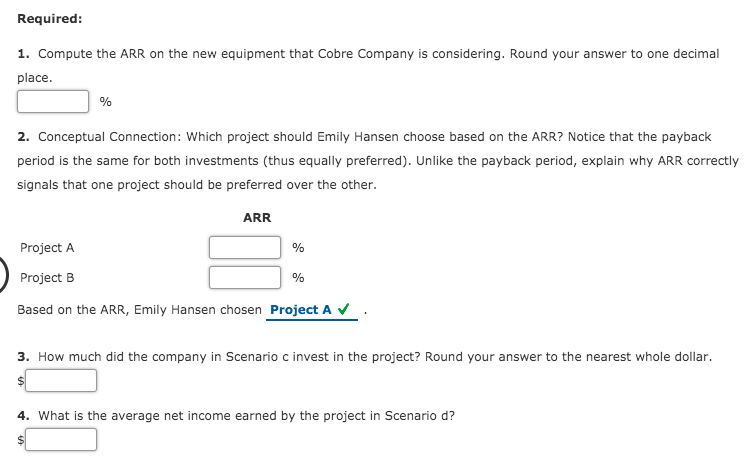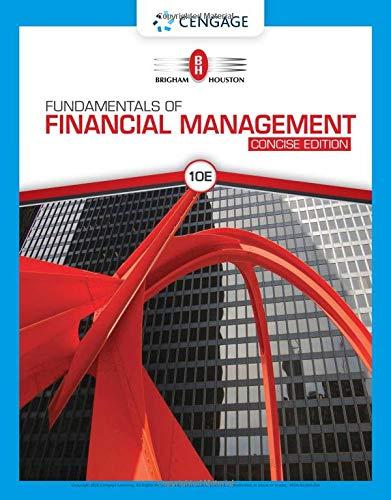a. Cobre Company is considering the purchase of new equipment that will speed up the process for extracting copper. The equipment will cost $3,800,000 and have a life of 5 years with no expected salvage value. The expected cash flows associated with the project are as follows: Year Cash Revenues Cash Expenses 1. $6,000,000 $4,800,000 6,000,000 4,800,000 3 6,000,000 4,800,000 4 6,000,000 4,800,000 6,000,000 4,800,000 b. Emily Hansen is considering investing in one of the following two projects. Either project will require an investment $75,000. The expected cash revenues minus cash expenses for the two projects follow. Assume each project is depreciable. Year Project A Project B $22,500 $22,500 2 30,000 30,000 3 45,000 45,000 4 75,000 22,500 75,000 22,500 c. Suppose that a project has an ARR of 30% (based on initial investment) and that the average net income of the project is $220,000. d. Suppose that a project has an ARR of 50% and that the investment is $250,000.
a. Cobre Company is considering the purchase of new equipment that will speed up the process for extracting copper. The equipment will cost $3,800,000 and have a life of 5 years with no expected salvage value. The expected cash flows associated with the project are as follows: Year Cash Revenues Cash Expenses 1. $6,000,000 $4,800,000 6,000,000 4,800,000 3 6,000,000 4,800,000 4 6,000,000 4,800,000 6,000,000 4,800,000 b. Emily Hansen is considering investing in one of the following two projects. Either project will require an investment $75,000. The expected cash revenues minus cash expenses for the two projects follow. Assume each project is depreciable. Year Project A Project B $22,500 $22,500 2 30,000 30,000 3 45,000 45,000 4 75,000 22,500 75,000 22,500 c. Suppose that a project has an ARR of 30% (based on initial investment) and that the average net income of the project is $220,000. d. Suppose that a project has an ARR of 50% and that the investment is $250,000.
Cornerstones of Cost Management (Cornerstones Series)
4th Edition
ISBN:9781305970663
Author:Don R. Hansen, Maryanne M. Mowen
Publisher:Don R. Hansen, Maryanne M. Mowen
Chapter19: Capital Investment
Section: Chapter Questions
Problem 10E: Roberts Company is considering an investment in equipment that is capable of producing more...
Related questions
Question

Transcribed Image Text:a. Cobre Company is considering the purchase of new equipment that will speed up the process for extracting copper.
The equipment will cost $3,800,000 and have a life of 5 years with no expected salvage value. The expected cash
flows associated with the project are as follows:
Year
Cash Revenues
Cash Expenses
$6,000,000
$4,800,000
6,000,000
4,800,000
3
6,000,000
4,800,000
4
6,000,000
4,800,000
6,000,000
4,800,000
b. Emily Hansen is considering investing in one of the following two projects. Either project will require an investment o
$75,000. The expected cash revenues minus cash expenses for the two projects follow. Assume each project is
depreciable.
Year
Project A
Project B
1.
$2,500
$22,500
2
30,000
30,000
45,000
45,000
4
75,000
22,500
75,000
22,500
c. Suppose that a project has an ARR of 30% (based on initial investment) and that the average net income of the
project is $220,000.
d. Suppose that a project has an ARR of 50% and that the investment is $250,000.
3.

Transcribed Image Text:Required:
1. Compute the ARR on the new equipment that Cobre Company is considering. Round your answer to one decimal
place.
%
2. Conceptual Connection: Which project should Emily Hansen choose based on the ARR? Notice that the payback
period is the same for both investments (thus equally preferred). Unlike the payback period, explain why ARR correctly
signals that one project should be preferred over the other.
ARR
Project A
%
Project B
%
Based on the ARR, Emily Hansen chosen Project A V
3. How much did the company in Scenario c invest in the project? Round your answer to the nearest whole dollar.
4. What is the average net income earned by the project in Scenario d?
%24
Expert Solution
This question has been solved!
Explore an expertly crafted, step-by-step solution for a thorough understanding of key concepts.
This is a popular solution!
Trending now
This is a popular solution!
Step by step
Solved in 2 steps

Knowledge Booster
Learn more about
Need a deep-dive on the concept behind this application? Look no further. Learn more about this topic, accounting and related others by exploring similar questions and additional content below.Recommended textbooks for you

Cornerstones of Cost Management (Cornerstones Ser…
Accounting
ISBN:
9781305970663
Author:
Don R. Hansen, Maryanne M. Mowen
Publisher:
Cengage Learning

EBK CONTEMPORARY FINANCIAL MANAGEMENT
Finance
ISBN:
9781337514835
Author:
MOYER
Publisher:
CENGAGE LEARNING - CONSIGNMENT


Cornerstones of Cost Management (Cornerstones Ser…
Accounting
ISBN:
9781305970663
Author:
Don R. Hansen, Maryanne M. Mowen
Publisher:
Cengage Learning

EBK CONTEMPORARY FINANCIAL MANAGEMENT
Finance
ISBN:
9781337514835
Author:
MOYER
Publisher:
CENGAGE LEARNING - CONSIGNMENT


Intermediate Financial Management (MindTap Course…
Finance
ISBN:
9781337395083
Author:
Eugene F. Brigham, Phillip R. Daves
Publisher:
Cengage Learning

Principles of Accounting Volume 2
Accounting
ISBN:
9781947172609
Author:
OpenStax
Publisher:
OpenStax College

Fundamentals Of Financial Management, Concise Edi…
Finance
ISBN:
9781337902571
Author:
Eugene F. Brigham, Joel F. Houston
Publisher:
Cengage Learning